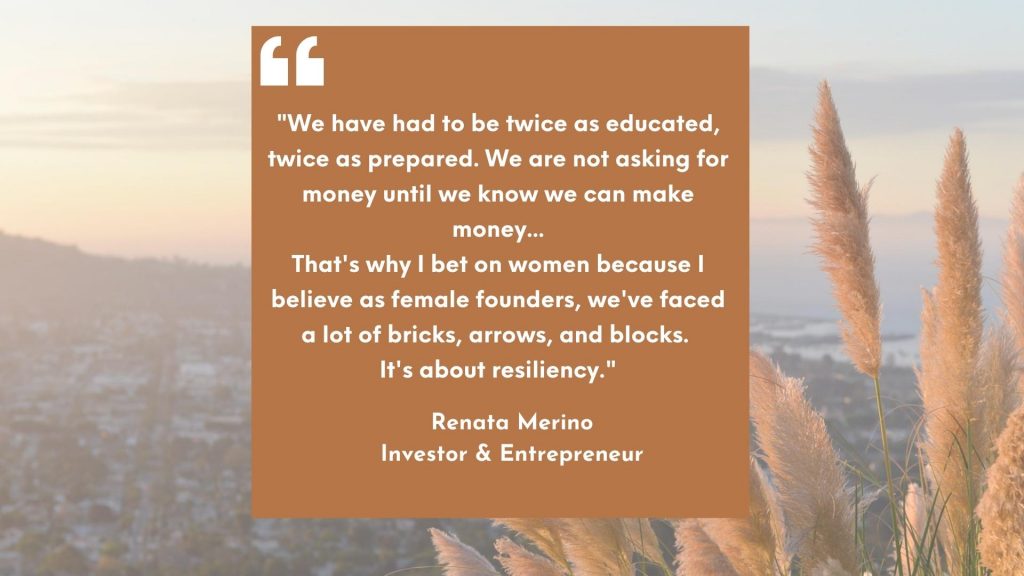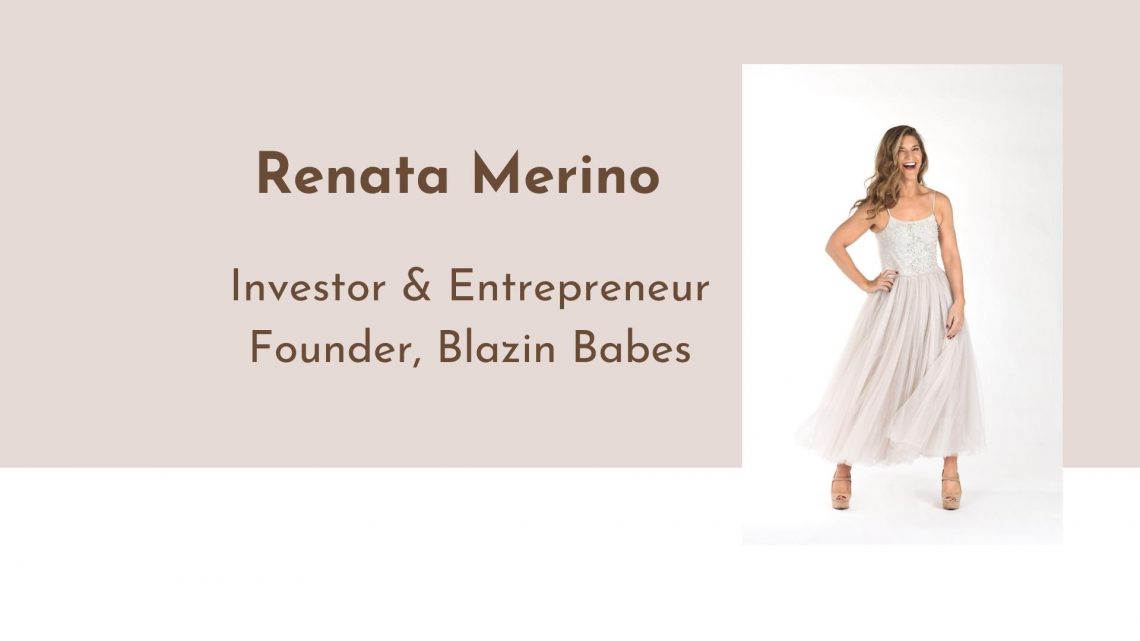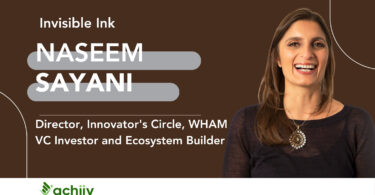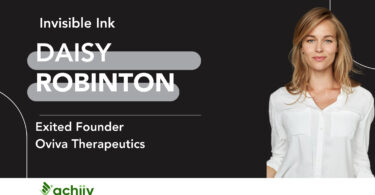About
Renata Merino is a LatinX serial entrepreneur, 20 yr operator, Chicago Booth merit scholar and former investment banker turned investor. She runs a female founder community and is an advocate for women. Her life purpose is to invest and fund female founders, speak on behalf of women empowerment, implement policy change for women and believes that women deserve a seat at the table as leaders.
Summary
Are you switching to entrepreneurship from a corporate career? Feeling isolated and alone? Confused about startup financing and unsure what to do next?
In this episode, Renata Merino, LatinX serial entrepreneur, 20 yr operator, Chicago Booth merit scholar and former investment banker turned investor, talks about her accidental entry into entrepreneurship, succeeding as a single mom, secrets to smart fundraising, how to get advisors for your startup, and more.Episode highlights
- Making the best of opportunities and learning the ropes
- Motherhood and entrepreneurship – the good and the bad
- Capital access challenges of women founders
- Secrets of startup financing
- Smart ways to increase your startup’s leverage
- How to build a great business model from scratch
- How to master the financials even when you don’t like numbers
- How to get great advisors without losing your shirt
- Founder pitfalls and how to avoid them
- The top 3 tips for female founders
Links & Resources
AllRaise – support network for female investors and founders
1871 – Chicago-area incubator
Blazin Babes – networking group for women
Republic Bank Entrepreneur program – support for women entrepreneurs
RenataMerino.com – Renata’s personal website

Interview transcript:
Shubha Chakravarthy: Thank you Renata, for joining us today! This is wonderful to talk to you, as an investor, as well as a founder. Thank you for being here.
Renata Merino: Thank you for having me. I’m excited.Shubha Chakravarthy: You have experience both as a founder and then a mentor — and now as an investor. Can you walk us through that journey and how that transpired?
Renata Merino: In college I didn’t know what I wanted to be when I grew up, so like most of us, I think I followed the crowd. I was raised with an immigrant father and a second generation mother. My sisters and I have always been raised to believe, “Girls can do anything.”
There’s no “boy job.” There’s no “girl job.” We can do anything.I followed a lot of my male classmates into investment banking right after undergrad, just because I thought that’s what people do.
I wasn’t passionate about numbers and as a liberal arts undergrad, I really was behind. I joined State Street Capital in Boston and it was two women out of a team of 30. It was very male dominated. At the time I did not know anything about debit-credit. I didn’t know anything about finance and so in Bowdoin College — that’s where I went as an undergrad, I only took economics. I did night classes as I knew I had to get myself up to speed. I really learned a lot about off-balance sheet financing, how to do debit-credit, present value money, all the things that we probably know now as older adults, but back then I didn’t know.
I think that was a really good foundation for me. In my career in general it was one of the biggest turning points that led me to becoming a founder and being focused on innovation. I left banking because it wasn’t as creative for me. It was very dry and I wanted to work in house and at a company.
I read this book called, “What Color is Your Parachute?”, which identifies your skills with your hobbies and it matched me with the fitness industry because I’m an athlete and I live in Boston. I networked and enabled my way to Reebok, in tech in 1999 when they didn’t really call it “tech”, they called it “.com.”
I was fortunate enough at age 26 to work directly for the CEO on a special stealth project which was an online footwear customization project. So, that experience led me into the world of innovation. I knew that I wanted to be in innovation. I didn’t know it was entrepreneurship.
So, I went back to business school at Booth — full time and focused primarily on new product development, design thinking and strategy marketing. I did not participate in any kind of a startup , but I really learned how to work within a company with a big budget and how to innovate, how to identify a problem, come up with a solution, and launch that solution using a cross-functional team, market research, finance, and all of the components of how to launch a product into the marketplace. Then I became a mom and I decided that I wanted more flexibility. That led me to the world of entrepreneurship.
Moving away from corporate into the startup world back in 2007 was a lifestyle change for me. Also, having more autonomy — when you are a founder you get your hands in more things. I wanted more of that. So, I ended up working for a serial entrepreneur in the children’s products division and media entertainment, video gaming, publishing.
Then I started launching my businesses. So, I had three startups, one is still in existence.One of the pain points I experienced as a female and Latina is the access to capital. It is just harder for us because it is a such a male dominated field that every time I pitched it was a struggle — and I was revenue positive.
The last company that I launched was a women’s community focused on female founders, helping women scale their businesses, whether it is a small business, a consulting business, or a tech product, by providing workshops, speaker series, and solutions to help women gain customers.
A lot of my women, the members, struggled with the same access to capital to scale. That’s the impetus for me to become an investor now — to get on the other side of the fence, as a female investor investing in other female founders to help them scale because I know it is a pain point that I personally experienced as a founder.
1800 startups a day in the United States are launched by women. That was a report by Boston Consulting Group in MassChallenge. Three or four years ago they reported that for every dollar invested in a female startup, the ROI is 67 cents on the dollar versus 31 cents on a male founder. The reason for this — my hypothesis is that as women, as we are raised as little girls, we have had to prove ourselves twice as hard.
We have had to be twice as educated, twice as prepared. We are not asking for money until we know we can make money. Whereas, I think male founders are more aggressive whether they’ve proven that they can make money or they are just a little bit more bold or maybe they’ve escalated it, they’ve blown their numbers out of proportion. We won’t do that.
That’s why I bet on women because I believe as a female founder, we’ve faced a lot of bricks, arrows, and blocks. It’s about resiliency.
Shubha Chakravarthy: One of the startups you mentioned was “Blazing Babes”. Can you talk a little bit more about what prompted it and what your vision was and how that has evolved?
Renata Merino: The impetus came when I became a new mom and moved from the city of Chicago into the suburbs. I felt really isolated as a new mom because I liked going to networking events. I felt like I wouldn’t resonate with a lot of the women in the suburbs because I had this preconceived notion. But to my surprise, I met all these amazing women who were raising their children and launching businesses.At the time this book came out called the “Stiletto Network”, written by Pamela Rickman. It was about all these micro coffee groups and wine groups popping up all around the United States, but with very edgy names like —“Babes” and “Boy Land”. So, really edgy, cool names anywhere from moms, launching businesses in their basement to high powered CEOs, helping each other with funding or making connections. Pamela talked about this network of women helping women. I wanted to launch my own Stiletto Network, beginning with one chapter only in Chicago.
I came up with a business plan, wrote the business plan in 2013, came up with the logo and the name and we launched in one night. I signed up 50 women and they paid for their whole year of membership. I had Danni Allen, who was the Season 13-Winner of “The Biggest Loser”.
That is when we were born and we have grown since then. We were primarily focussed on face-to-face networking events. Now with COVID, we have shifted more to online and we are going to be relaunching. One of the most important things is that it is about women supporting women.
So, it’s a give and get type of environment. The other thing that differentiates us from most other community groups is that we’re a B Corp. B Corp’s are for profit companies that pay it forward, that use business as a force for good. In all of our events, we always incorporate an element of giving back — we’ll have a sponsor, we will rake some of the ticket sales. If we have membership dues, ticket sales, the revenue that we’ve generated — we’ll donate, or do in kind donations to that particular charity of choice. We’ve donated quite often to “Bright Pink” and “Dress for Success”.
These are all nonprofits that help underserved women that don’t have the means to advance their career. We really pride ourselves in that.
Shubha Chakravarthy: One of the things you mentioned was this need for networks and meeting other women. What are some of the things women founders should do to help them to more successfully launch their businesses from these experiences?
Renata Merino: Every single founder should join a community of other founders — accelerators and incubators.In 2017, I was accepted to 1871 Chicago’s LatinX incubator program. It is a four month program where you meet once a week from nine to five. It was really primarily for male and female Latin X — different generations, different economic backgrounds, different stages. One of the things that really benefited me is — when you are a founder, you are often very isolated. Maybe the community that you’re in, there are no other founders, they are more corporate people and it is really hard to relate and have conversations with them because they don’t know the stresses. They’re getting a steady paycheck. You are on a budget. There may be days where you have wins and you gain a customer or there may be days when you can’t even make anything or pay your bills.
There are a lot of ups and downs emotionally. One of the things that was hard for me, even though there were other women was that there weren’t any women that were mothers. I’m managing the house, I’m doing everything with my kids, taking them to school. I have this additional responsibility and it is hard to relate. Just to have the community support, to have the discussion, to say, “How are you doing it? What are some tips?”
Female founders need to join a community that suits their needs whether it is an online community or offline. It is not just for emotional support or one’s personal life but also guiding them through strategies on how to do your pitch, how to raise capital, how to scale your business, how to do the hiring, what are resources that you could share with other women?
One of the groups I am a member of — and I will promote them till the day I die is “All Raise”. All Raise does a great job. It’s mostly for female fund managers, not for founders. They have been a saving grace for me in terms of being supportive as an investor.
Having a community of women for female founders is critical and that’s what we’re doing with “Blazing Babes”.
Shubha Chakravarthy: Are there learnings through your interactions with other founders as an investor and a mentor as well that you have seen in terms of critical milestones, like launch or scaling, getting funded? What are some things that have stuck in your mind ?
Renata Merino: The pitch deck has to be done correctly. It could be female or male, but it is frustrating as an investor when I get a pitch deck and they don’t have the 12 to 15 slide with the right components because we look at so many different pitch decks.
Even if you have a great network but your pitch deck just doesn’t address all the business points, you are just going to lose the interest because we just look really quickly.
That’s the number one thing. The other thing is I think she’s always talked to a lawyer. It’s really understanding if you are going to raise, “What are the aspects of raising? Do you always have to raise venture capital? Can you borrow money now?”
Going to friends and family, trying not to give away so much equity and understanding your cap table, understanding when you bring on people — it is like a marriage and not giving away too many shares is important.
A lot of founders don’t understand that there are advisor shares versus board member shares. Who is on your advisory board? You start with not giving shares away and then they can earn shares and that is really critical to your growth and acquiring new customers and in scaling.
Really understanding the legal and the financial aspects of the raise of the cap table, making sure, because a lot of these, and I’m speaking from hearsay, I’m not going to throw all my fellow investors or VCs under the bus, but if you marry the wrong person — meaning you get the wrong investor on your cap table, they could really take advantage of you.
You want to make sure you set yourself up for success and you get the right legal advice and financial advice before you move forward.
The other people I like to highlight is — Republic Bank. They have a program for founders, female, and male, for their personal banking. So, signing up with them to do your personal banking, they’ll help and grow with you and they have an ancillary arm of lawyers that can help you. I think it is important to have the right support system behind you legally and from a financial aspect.
Shubha Chakravarthy: You talked about making sure that a pitch deck is right. Many women founders don’t go for outside funding. Let’s say you don’t plan to raise outside funding. Do you still think it’s important to create this pitch deck and why?
Renata Merino: If you are not going to go for outside funding, having a business plan is really critical.
If you are going to run a business, if it is a small business and you are not looking for outside funding, you need to understand how you are going to run your business, especially when you are going to start scaling.
Understanding the components of a business plan, having a financial model, understanding where your customers are coming from, who your target audience is, what your mission is, and what’s your tagline is important.
One of the things I always ask all my founders, whether you are going to raise or whether you are just not going to raise is have a “Brand Bible”.
It is a one page document that has the mission, vision, target audience, positioning, brand attributes, and tagline — it is a summary of your platform, your startup.
Every time you onboard somebody, a new team member, you want to make sure that they are using the same language, that they are talking about your brand and your company in the same way. It is just to keep everybody on the same page.Having the business plan in lieu of the pitch deck is probably a smart move as any kind of a businesses owner.
Shubha Chakravarthy: One more question on that topic of the business plan — One of the things I’ve heard from starting founders is that they tend to get daunted by the financials. You need to put up a business plan, but even before the financials, there are some businesses or founders who don’t know what their business model is.
What do you do to narrow down key elements of a business plan if you don’t know for sure what they are?
Renata Merino: I’m going to give an example of when I started a service business that wasn’t venture backed.
I didn’t borrow any money. I scaled on my own. It was a consulting service that helped get prospective MBA candidates into the top 10 business schools. I started that in around 2007 and scaled it. I actually had to hire up consultants because I had so much demand and not enough people supporting them.
I focused mostly on international students because they didn’t understand the process of applying to business school and I’m fluent in Spanish. They were mostly in Latin America.
I needed to figure out how to price. I knew that this service sector existed. It didn’t exist for international or maybe it did, but it wasn’t prevalent. So, I had to start with one client at a time.
I found somebody and I said, “What would be reasonable for you?”
I was trying to figure out how much should I charge? We negotiated and I figured it out. At the time I charged like a package deal. “I’m going to do five schools for you at this price.”
I tracked how many hours I put into this candidate. I also did some benchmarking. I asked around as I was going through this arduous process and realizing, “Wow, this guy doesn’t know how to write. He doesn’t know how to do a resume. I have to do everything for him.”
I figured out how much work was involved. Then I tried to ask around, I did some benchmarking of other such businesses, consulting businesses and what they charge per hour.
I figured out on a spreadsheet after doing some benchmarking after doing the work, this is what I should be charging in packages, offering an hourly rate, averaging a packaging rate and then as I got the second customer, I would offer them options.Then you tweak the packaging based on the feedback that you get and then I was able to easily estimate what my future projections were.
Then I was also able to figure out the seasonality of my business. When the customers wanted to hire someone — I figured it was around summer. They take the GMAT. The first application was due. So, I was able to figure out on a yearly basis how much money and how much one consultant can handle, how many clients are getting handled within a given year. I could project per consultant, how much revenue they can drive based on that.
You should always start with one customer at a time and be able to refine your services or your product based on feedback. That’s my recommendation.
Shubha Chakravarthy: Sounds like a great first step for a starting founder, even if they are feeling overwhelmed or challenged by not being able to build a big 30 page business plan, that they can start somewhere with what they have.
Renata Merino: Right. You start with what you have and you just have to know that there is a need for your service or your product. That is in any pre-seed company when you are just getting going. “What is the willingness to pay? Is this somebody going to pay for what you are coming up with your solution?”
You need to prove it one customer at a time.
Shubha Chakravarthy: I’m going to take one detour. You used a couple of words such as pre-seed, pre-revenue. Are there different stages that whether you are venture funded or not, but you can think about, that would be helpful to understand?
Renata Merino: Usually the way it works is when you are a startup, whether you are a small business or one that doesn’t want to be venture backed or they do, either you have your own money or you have friends and family because you need money to get going.You need to develop a tech product and if it is a service , you need money to market. Usually you either use your own money or you go to friends and family just to get started, just to prove what we just talked about, that someone’s going to pay — a customer, one customer or two customers or three customers, we’ll pay for your service. The more savvy you can do using your own money to prove your business idea.
So if you can stretch a dollar, good for you. The next level after you have used the friends and family or your own personal funds is called pre-seed.
So, it is not necessarily that you have to have revenue, some people do, but you have proved that there is a demand for it. That’s what we like to refer to as pre-seed and usually that is cheque sizes – anything under a million. It changes depending on which platform you’re talking about or which sector .
The seed level is then that you already have a lot of customers and you are already making money and but you feel like “I need capital. I need to refine the platform.”Maybe it is a tech platform and now I need to scale, maybe if it is brick and mortar and you have proven one location and you are like — “Now I want to expand to different locations.”
So you need the capital to hire some people, refine the technology, expand.Then the next would be Series-A, which is a much higher level. I just focus primarily on pre-seed and seed.
Shubha Chakravarthy: One of the challenges that is common to women and women founders is this lack of financial self-efficacy — a lack of financial confidence.
Have you seen that in the course of advising other women founders? What are your observations and how can women founders get over that?
Renata Merino: I’ve seen some male founders that don’t even have a financial model. It is kind of ridiculous.
So, two things, if you don’t have the financial acumen and don’t know how to build a financial model, I highly suggest you find someone on your team, even an intern that can help you. You still need an expert who knows how to do that and can help you. You always want to learn. Even if it is something that you are afraid to do.
I hate dealing with numbers. I’ll deal with it, but I’d rather have someone else who loves it do it and just give me the high level. But that is not something I’m passionate about. If I have to do it, I’ll do it, but I don’t want to do it.
But having an advisor, an intern, somebody on your team, you can also hire it out. I know a lot of people hire out help to build a financial model. You can do that as well.
The one area I think that women — myself included when I was a founder, what we get stuck with is when we are pitching and we are revenue positive. We get a lot of pushback and some male founders don’t. So, be ultra prepared with answers, numerous answers. You can answer it and and then the guy will still re-ask the question in a different way and then you are going to re-answer it in a different way.
Being persistent and being really confident — it starts with having advisors and people that can give you the self-confidence because you are going to be the one that’s pitching .
Shubha Chakravarthy: What I’m hearing is that it is about the preparation.
Renata Merino: Yes. If you feel like that is a weakness and any really great leader should know this, you hire your weakness.
If you can’t afford to pay them, you make sure that they are in your advisory board. So, if you want to be a strong company, you always have to hire your weakness.
I would never avoid the subject of the financial model. I would hire somebody who can teach you and when you are presenting, having that person in the room with you to be able to answer the more intricate financial questions is fine, even if it is a male.
So, whoever you are pitching to and wherever you are selling, even if it is a customer, they know that you have everything, buttoned up.
Shubha Chakravarthy: One of the things I’ve seen in the research is this need for a champion, somebody who’s going to fall on the sword and say, “Hey, this is the greatest person ever doing XYZ.”
How important is that? How do you find one?
Renata Merino: I wouldn’t say one champion. I think if you’re preceding, meaning you are pre-revenue or you are just starting out, whether you are fundable or not, I think having a team of advisors matters. If you can’t pay for a CFO, you want to make sure that you hire your weakness or you find advisers.
Start off with people in your network that believe in you. People that maybe you have worked with in the past, that are part of your network, maybe it is not someone you worked with but a friend of a friend and you say, “Hey, you are an expert in this area!”
Let’s say you are in the beauty area. You are launching a beauty business and you found somebody that used to work at J & J. So, they’ve been in beauty and they understand, they love what you are doing.
They love your product, they have tried it, or they love your service and you can say to them, would you mind giving me an hour of your time for the next three months per week? Give me advice on — How we’re building this business, the product, the packaging, the marketing, or whatever and then, if you like me and I like you and you like what we are doing, I would love to be able to give you advisor shares as compensation for your time.
It is almost like dating, you kind of start off seeing each other, like each other, and then if it works out, then you want to compensate someone and maybe potentially they would invest money into your company and you give them more than just advisor shares. But use your network to find the people that could give you advice on how to get on the shelf at a retail.
Maybe it is an e-commerce expert, maybe it is a social media expert a marketing expert, whatever the areas that you are not good at, and you don’t have connections in, that is where the need you need to fill in is. So it is not just one champion. I think it’s really a team of advisers.Shubha Chakravarthy: One thing that has been hard in the news lately is unconscious bias. Have you faced this on either side? What advice would you give to a woman founder who is facing unconscious bias?
Renata Merino: I think there’s a bias with mostly male dominated venture capital space on female founders that they don’t know finance, they don’t know numbers, even if it would experience. It’s very disheartening. You have to be ultra prepared, you really need to have strong team behind you, and be prepared with multiple questions. There are more roadblocks that we face as female founders in terms of unconscious bias.I’ve heard this story where, if it is so that you are the founder and you have a junior person, like an intern, who is male and who is there, the male venture cap keeps directing all the questions to the the male intern. You really need to say, “You know what? I appreciate you directing all the questions to John here or whatever, but I’m the founder and I’ll answer the questions.”
You don’t want an investor on your cap table that is not going to give you the respect that you deserve. So I think it is harder.
It’s like a marriage. So if you are getting biased from the investor, you don’t want that person. I know you need the money, but that means you have to be very good at talking to other founders and who they have used to invest in their companies because word gets around. So, talk to the female founders getting funded by non-biased investors and get referrals that way. That is what I highly advise.Shubha Chakravarthy: You mentioned earlier that you are a double minority. I can certainly relate to that. What is different or what is more challenging when you are not only a woman, but you are also a woman minority. As a founder, what advice would you give them to overcome some of these barriers?
Renata Merino: Being a minority is a good opportunity right now because a lot of people are investing in minorities. Turning to other successful minority founders or minority fund managers that have raised, scaled their business and asking them for advice, leveraging who has done it well is the way to go.Finding other double minority female founders that have been successful and asking them for advice and their strategies of whatever you are tackling — raising capital, scaling your business, acquiring a customer, marketing. I think it is really important to get advice from other founders. It doesn’t matter if they are in your industry or not.
Shubha Chakravarthy: What are the top five pitfalls that you would caution women entrepreneurs against?
Renata Merino: That’s a really good question. I think hubris is a major problem with some founders.I also think hubris is a major problem in business in general, but really having a chip on your shoulder, especially if you are a repeat founder, I think nobody wants to work with somebody who has ego.
Also a critical point is, “Why are you the right person to do this?”How does your personal story relate to why you are doing this? Women or men, what is your why? How does your past career history, personal history relate to what your why is? People invest in people and so humility and knowing your “why” is a really good hook.
It should be coming from an authentic place as well because we are investing in people and we are investing in you. If it is a female founder, I want to know does she have a partner? Who is her husband or partner and is she supported by them? Does this person support her and what she is doing because if it is someone who was in a relationship where my startup wasn’t supported, it really contained your business. If you don’t have the infrastructure of support behind you at home, it can really be the demise of your company. The fourth is, proving in your pitch or whenever you reach out that you are very agile at overcoming adversity. What happens in a business is you have a business plan but things are going to change — you could have a pandemic!You need to be able to change on a dime to keep your business alive. So proving, however it is with your actions and what you have done in the past, how have you been able to overcome adversity and changes in your life?
That is a huge, critical skill whether you are male or female. I think women are better at it. We don’t complain, we just do. The fifth thing that I like is empathy. Somehow showing that you have empathy for your customers, when you are selling and you have got the solution. You need to have empathy for this problem, it needs to matter to you. So those are my off the cuff top five.Shubha Chakravarthy: I love it. So my last question, if you just had to leave a woman founder with three things, keep these three things in mind, what would those be?
Renata Merino: Number one, self care . Set up a routine for yourself that involves self-care, whatever self-care means to you.
I think eating healthy, exercising, drinking water, mental health — like meditation. Set up a daily protocol for you that keeps your mental, emotional, and physical health intact. When mom’s down, everyone’s down — when the founder’s down, everyone’s down. So you need to stay healthy — mentally, physically, and emotionally healthy.Join a community of support. Make sure you have a community of founders, female founders, whether it is an accelerator and incubator, an online community, an offline community, a place you go to work that you have, that support system is needed.
When You are working in an office alone or your home office and you are not connecting with anyone else because you are having a stressful day, it is going to affect you. Number three, okay, this is going to be hard. This is going to be an anomaly for someone who is an investor. This is against the grain, but if you can’t and if you don’t need to get outside funding, don’t get outside funding. You stretch your dollar as far as you can. Let me tell you something. If you can generate a significant amount of revenue on $1, try to do that the best because your valuation is going to skyrocket and you will give away less of the farm. You keep most of the equity. So, this is just going against what I am and you are probably going to quote me on this, but that is fine. I am totally cool with that.Shubha Chakravarthy: I love it. Awesome. Thank you so much for doing this!







